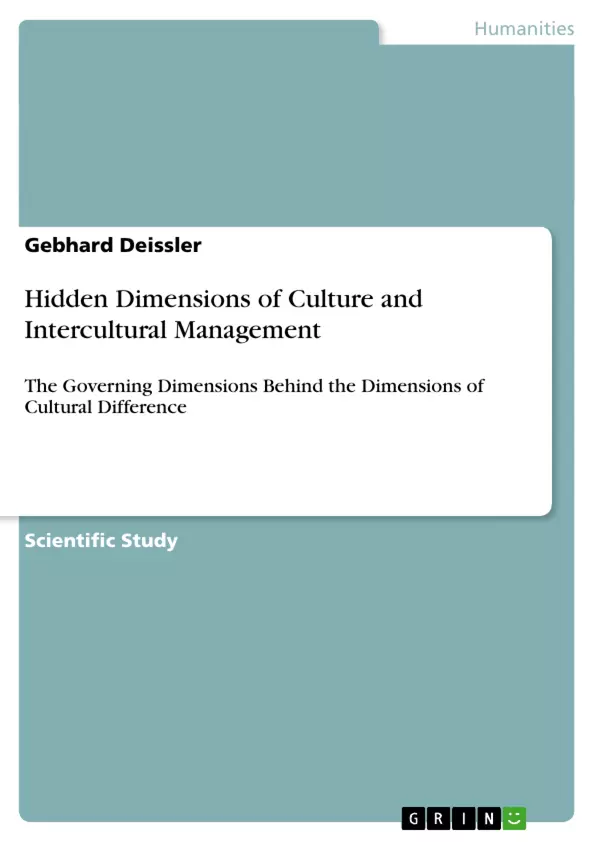This study shows that the driving forces behind human cultural behaviours can be traced - beyond cultural values - in the wider space of human consciousness from where they can be managed more effectively.
Inhaltsverzeichnis (Table of Contents)
- Part 1: The Development of Human Cultural Awareness, Knowledge and Skills
- 1. The state of the intercultural art and science: On human relativity in intercultural research
- 2. Enhancing the intercultural art and science: Sources, models and the achievement of supreme cultural intelligence
- Part 2: A Pioneering Exploration of Hidden Cultural Dimensions
- 1. Transnational Management
- 2. Global Negotiations
- 3. Overcoming the Intercultural Faultline Gap Through Evolutionary Interculturalism
- 4. Decoding Cryptic Icons Culturally
- 5. Culture and Ethics. Absolute versus Contingency Approach
- 6. The Dawn of an Intercultural Metascience. 360° Transcultural Synergy
- 7. Finding the Space Age Intercultural Formula. Managing the Human Matrix in the Intercultural Interfacing Process
- 8. Identity and Relationship as the Basis of Culture and Civilisation
- 9. The Identity War: Diversity, Reciprocity and the Ethics of Peaceful Coexistence
- 10. The Cosmic Dimension
- 11. Child of the Universe. Oneness
- 12. A Glance at German Lands
- 13. Cultural Healing of Germany
- 14. Identity, Culture and Freedom
- 15. The Relationship between Culture Area and Geopolitical Space
- 16. The Subquantic - Supercosmic Continuum
- 17. Orient and Occident. East-West Synergy
- 18. The Ultimate Game. Quantum Culture
- 19. Cosmics
- 20. The Conquest & Ownership of and Leadership from the Innermost Center
- 21. The Topography of a Universal Eco-Culture
- 22. The Metamorphosis of the Islamist Labyrinth
- 23. Metropolism, Cosmopolitanism, Cosmism
- 24. Global Culture Systems Analysis: Sustainability and Accountability
- 25. The Ultimate Panacea for Culture Clash. Managing the Clash of Civilizations
- 26. A Changing Optic. UT UNUM SINT
- 27. Transcultural Intelligence - TCQ
- 28. Third Millennium: Managing Fundamentalism, Liberalism and Reason
- 29. Divine Cybernetics
- 30. Cultural Engineering. Beyond Relativism
- 31. The Creative Culture Circle
- 32. Black Forest Cherry Cake
- 33. Cosmic Man
- 34. Transcultural Policy
- 35. Cultural Fundamentalism
- 36. Third Millennium Axiology
- Part 3: The Extension of the Range of Intercultural Management Instruments
- Part 4: The Extension of the Range of Intercultural Management Instruments
Zielsetzung und Themenschwerpunkte (Objectives and Key Themes)
This book aims to provide a comprehensive exploration of cultural differences and their impact on various aspects of global management. It delves into hidden dimensions of culture and their influence on intercultural communication, negotiation, and conflict resolution.- The nature and significance of cultural differences
- The development of cultural awareness, knowledge, and skills
- The challenges and opportunities of intercultural management
- The role of cultural intelligence in global collaboration
- Strategies for navigating cultural faultlines and achieving transcultural synergy
Zusammenfassung der Kapitel (Chapter Summaries)
- **Part 1:** This section sets the foundation for understanding intercultural dynamics. It explores the state of the art and science in intercultural research, highlighting the importance of recognizing human relativity. The second chapter delves into the sources and models of intercultural intelligence, ultimately advocating for the achievement of supreme cultural intelligence.
- **Part 2:** This part embarks on a pioneering exploration of hidden cultural dimensions. It examines diverse aspects of intercultural management, from transnational collaboration and global negotiations to overcoming cultural faultlines. It also addresses the decoding of cultural icons, the relationship between culture and ethics, and the development of a transcultural metascience. Additionally, the chapters delve into topics such as identity and relationship as the basis of culture, the identity war and peaceful coexistence, and the cosmic dimension of culture. Further chapters discuss the relationship between culture and geo-political space, the interplay of East and West, and the concept of quantum culture. The section concludes with a discussion of the quest for leadership from the innermost center, the topography of a universal eco-culture, and the metamorphosis of the Islamist labyrinth.
Schlüsselwörter (Keywords)
This book focuses on the key concepts of intercultural management, cultural intelligence, cultural differences, cultural diversity, transnational management, global negotiations, intercultural communication, transcultural synergy, and the clash of civilizations. It also explores themes such as identity, ethics, and the role of culture in shaping individual and societal perspectives.Frequently Asked Questions
What are the 'Hidden Dimensions of Culture'?
They refer to the driving forces behind human cultural behaviors that exist in the wider space of human consciousness, beyond just surface-level cultural values.
What is Transcultural Intelligence (TCQ)?
TCQ is the ability to navigate complex cultural faultlines and achieve synergy across different cultures in a globalized management context.
How does the book address the 'Clash of Civilizations'?
The study explores strategies for managing cultural clashes by looking at identity, ethics, and peaceful coexistence through an evolutionary intercultural approach.
What is the relationship between culture and global negotiations?
The research shows that understanding hidden cultural dimensions is crucial for effective global negotiations and transnational management.
Does the book cover specific regions like Germany or the Orient?
Yes, the chapters include specific analyses of German culture, the "healing" of Germany, and the synergy between Orient and Occident (East-West).
- Citation du texte
- D.E.A./UNIV. PARIS I Gebhard Deissler (Auteur), 2012, Hidden Dimensions of Culture and Intercultural Management, Munich, GRIN Verlag, https://www.grin.com/document/195726



